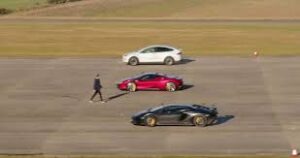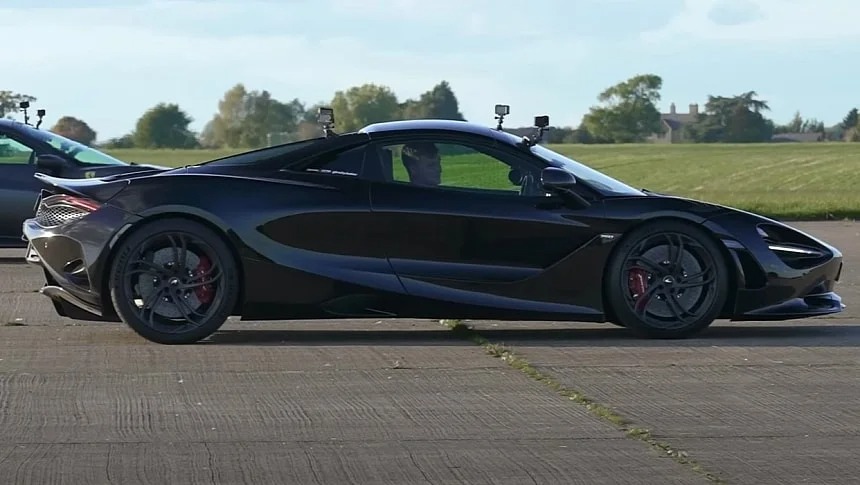Tesla Model X Plaid Races Two Supercars, known for redefining performance in the electric vehicle (EV) category, recently faced off against two formidable supercars in a race that not only highlighted its exceptional capabilities but also cemented its place as a serious contender in the high-performance automotive world. When Tesla’s flagship SUV is put to the test alongside traditional internal combustion engine (ICE) marvels, the results often transcend mere speed, offering a glimpse into the future of automobile engineering.

The Model X Plaid represents Tesla’s ambition to merge practicality with extreme performance. Equipped with a tri-motor all-wheel-drive system, it delivers a staggering 1,020 horsepower, propelling the nearly three-ton SUV from zero to 60 mph in just 2.5 seconds. This feat makes it one of the fastest production SUVs in history. However, speed is not the only factor that positions the Model X Plaid as a competitor; its advanced aerodynamics, instant torque delivery, and software optimization play crucial roles in its dominance on the racetrack.
The Contenders and the Context
The two supercars that took on the Model X Plaid in this race brought their own impressive credentials to the challenge. These vehicles, representatives of ICE engineering at its peak, offered lightweight designs, high-revving engines, and decades of refinement. To juxtapose the cutting-edge EV against these supercars is not only a test of speed but also a clash of two paradigms—electric innovation versus traditional automotive craftsmanship.
In a straight-line drag race, the Tesla’s electric motors delivered instant torque, a key advantage that often leaves competitors scrambling to keep up in the initial seconds. Yet, the question extended beyond the immediate launch: how would the Model X Plaid hold up over longer distances where ICE vehicles typically have an edge due to sustained power output at high speeds?
Performance Analysis
To better understand the performance metrics, consider a detailed comparison of specifications:
| Feature | Tesla Model X Plaid | Supercar A | Supercar B |
|---|---|---|---|
| Power Output | 1,020 hp | 710 hp | 765 hp |
| Torque | Instant (Peak 1,050 lb-ft) | 480 lb-ft | 500 lb-ft |
| 0-60 mph Time | 2.5 seconds | 2.8 seconds | 3.0 seconds |
| Top Speed | 163 mph | 211 mph | 205 mph |
| Weight | 5,390 lbs | 3,200 lbs | 3,350 lbs |
The table underscores the Model X Plaid’s dominance in acceleration while highlighting the lighter weight and higher top speed of the supercars, which could influence performance in extended races or high-speed tracks.
Outcome of the Race
As the race unfolded, the Tesla Model X Plaid surged ahead in the initial stages, utilizing its instant torque to secure a significant lead. Electric vehicles, unburdened by the mechanical lag of gear shifts, excel in short sprints. However, as the race progressed, the supercars began to leverage their lighter weight and aerodynamic advantages, closing the gap. Yet, the Plaid’s combination of software-managed energy delivery and superior power-to-weight ratio allowed it to maintain its edge, finishing with a narrow but decisive victory.
Implications for Automotive Technology
The results of this race carry broader implications for the automotive industry. The Tesla Model X Plaid’s victory is a testament to the strides EV technology has made in recent years. It showcases the potential of electric drivetrains to not only match but often exceed the performance of traditional ICE vehicles. This development sends a clear signal to automakers worldwide: the era of dominance by gasoline-powered engines is drawing to a close.
Additionally, the race highlights the growing relevance of software in vehicle performance. Tesla’s ability to fine-tune power delivery, traction control, and aerodynamics through over-the-air updates gives it a competitive edge that extends beyond the mechanical hardware of the vehicle.
Challenges and Opportunities
While the Model X Plaid’s performance is undoubtedly impressive, challenges remain for EVs in general. Range anxiety, charging infrastructure, and battery longevity continue to be areas of concern for potential buyers. The race demonstrates what EVs are capable of under ideal conditions, but real-world applications often pose different challenges.
On the other hand, opportunities abound. As battery technology improves and charging networks expand, EVs like the Model X Plaid will become even more appealing to consumers. The high performance of vehicles like this also helps dismantle the stereotype that EVs are limited to being eco-friendly commuter cars.
The Tesla Model X Plaid’s victory over two renowned supercars underscores a shift in the automotive world. This race is not just about speed; it represents a broader narrative of technological evolution and sustainability. By choosing electric powertrains without compromising performance, Tesla has shown that the future of high-speed innovation is electric. You are witnessing a pivotal moment where tradition meets progress, and the results are nothing short of extraordinary.










Add Comment